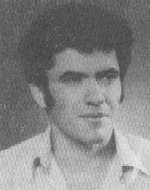Eliahu (Eli), son of Amalia and Mordecai, was born on February 18, 1950, in Haifa, where he studied at the Habonim elementary school and completed his studies at the Ironi High School in Haifa. He was a diligent and thirsty student and was interested in many fields, never bragging about his accomplishments or displaying his knowledge, and it was usually difficult to tell him, but when he spoke, his words were purposeful and interesting: he was a member of the Hanoar Haoved Vehalomed movement, He was a sports fan and a lot of basketball player, he was naturally withdrawn and it was difficult to get close to him, but he was always very close to his refusal to give up on anyone Although he was a little timid and a little talkative, his kindness and willingness to help others were visible to all, and he was content with the least and was Simcha with his lot, friendly and friendly to his friends. “I have to help my parents,” he insisted on the reactions to the great effort involved, and he was tall, handsome and broad-shouldered, and the stiffness of his face was easily replaced by a kindly expression that smiled shyly. Eliahu was drafted into the IDF at the end of July 1968. After completing basic training, he was trained in the Armored Corps course, after which he was sent to a training course in which he was assigned to a tank unit in Sinai. He was a good soldier and an efficient commander, disciplined and dedicated to his job, with excellent technical knowledge, with great will and ability. During his service he participated in the War of Attrition and many fire incidents and was given the “Operational Service Award”. His comrades-in-arms wrote: “He turned out to be a cold-tempered commander in combat, and the stories of his cold-bloodedness and indifference under fire made them wings and turned him into a company and battalion.” He tried not to worry his parents and never told them what he had been through. Even in his last letter to the family, close to the day he fell, he wrote: “In any case, there is no place for special concern.” After he was discharged from the regular army, he began studying at the Technion’s Department of Industry and Management, and later enrolled in the Hebrew University, where he worked in the Computer Unit of the Ministry of Education and Culture in Jerusalem. In the Yom Kippur War, Eli participated in the battles of containment and break-ins against the Egyptians in the Sinai. On the 21st of Tishrei 5734 (21.10.1973), Eli attacked the Masuri outpost north of the Chinese Farm in an attempt to expand the bridge, which he had already taken part in after he took part in heavy battles in the central section of the Canal Suez. In the battle for Misuri the tank that served as a contact was hit and he was hit and killed. He was laid to rest in the military cemetery in Haifa. Survived by his parents and brother. After his fall, he was promoted to First Sergeant. In a letter of condolence to the bereaved family, Yigal Allon, Deputy Prime Minister and Minister of Education and Culture at the time, wrote: “I heard about my late husband and your home, a Jewish home, about your extensive family who perished in the death camps. Your loved one went out to defend our home – and did not return. “Michael Rabin, the rector of the Hebrew University of Eli who enrolled to study there, wrote:” The image of your son Eli is standing before us, and the example of his supreme sacrifice obligates all of us. ” His family published a pamphlet in his memory of friends, commanders and acquaintances, as well as letters he sent from the front. Yehuda wrote his brother: “In his fall, Eli commanded us to live as he saw them: we must look for everything in the good and try to understand the other, to learn from others, but to make them wrong when they claimAnd try to do everything in the best possible way and with the proper attention, without advertising, quietly and modestly. “
